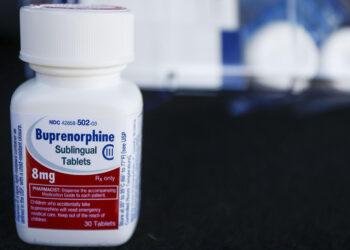TOPLINE:
Human leukocyte antigen B27 (HLA-B27) positivity was associated with higher odds of non-remission in patients with juvenile idiopathic arthritis (JIA) at 18 years after disease onset, with men showing a particularly elevated risk.
METHODOLOGY:
- Previous research has shown that HLA-B27 was negatively associated with remission status at 8 years after the onset of JIA in a Nordic cohort, particularly related to specific clinical disease characteristics such as sacroiliitis.
- This prospective study assessed the predictive value of HLA-B27 for disease outcomes at 18 years after disease onset in 434 patients from the Nordic JIA cohort across Denmark, Finland, Norway, and Sweden.
- Baseline visits occurred within 6 months of disease onset, with the follow-up performed approximately 18 years after disease onset either in-person or through standardised telephone interviews.
- HLA-B27 status was analysed using various methods and registered for 416 patients, with a positive status noted in 93 patients (30.1% men and 18.7% women).
- Clinical data, including inactive disease, clinical remission status (meeting the criteria for inactive disease for a minimum of 12 months without taking anti-arthritis or anti-uveitis medications), a joint with active disease, inflammatory back pain, and sacroiliitis, were collected.
TAKEAWAY:
- Individuals who were HLA-B27 positive more often had first- or second-degree relatives with ankylosing spondylitis and symptomatic uveitis than those who were HLA-B27 negative.
- The involvement of joints, including sacroiliac, hip, and subtalar joints, was more common in men who were HLA-B27 positive than in women who were HLA-B27 positive.
- HLA-B27–positive individuals had higher odds of not being in remission off medication after 18 years than HLA-B27–negative individuals (odds ratio [OR], 2.6; P = .001), with the odds being higher for men (OR, 5.6; P < .001) than for women (OR, 1.7; P = .10).
- In HLA-B27–positive individuals, clinical features, such as inflammatory back pain, enthesitis, and uveitis, were associated with significantly increased odds of not being in remission off medication after 18 years (P < .05 for all).
IN PRACTICE:
“This study contributes valuable insights into the long-term adverse implications of HLA-B27 positivity in JIA, highlighting gender differences and persistent clinical challenges. The results raise the question of whether screening for HLA-B27 should be considered for all patients with JIA,” the authors wrote.
SOURCE:
This study was led by Maria Ekelund, MD, PhD, Uppsala University, Uppsala, Sweden. It was published online on March 20, 2025, in ACR Open Rheumatology.
LIMITATIONS:
The small number of individuals with sacroiliitis and limited imaging examinations restricted the conclusions that could be drawn. Additionally, the study’s inclusion period coincided with the early introduction of biologic drugs, which may have affected comparison with more recent studies. The authors also acknowledged the use of different imaging techniques, which are not interchangeable.
DISCLOSURES:
This study received support from Reumatikerförbundet, Gillbergska stiftelsen, Futurum-Akademin för Hälsa och Vård, Region Jönköpings läns, and Uppsala Universitet. Some authors reported receiving research support and support for attending meetings. One author reported being a secretary of the JIA working party PReS and a member of the Pediatric Rheumatology editorial board. Another author reported being a member of the Data Safety Monitoring Board for a trial.
This article was created using several editorial tools, including AI, as part of the process. Human editors reviewed this content before publication.
Source link : https://www.medscape.com/viewarticle/hla-b27-status-linked-poor-outcomes-jia-after-18-years-2025a10007cq?src=rss
Author :
Publish date : 2025-03-31 12:00:00
Copyright for syndicated content belongs to the linked Source.














